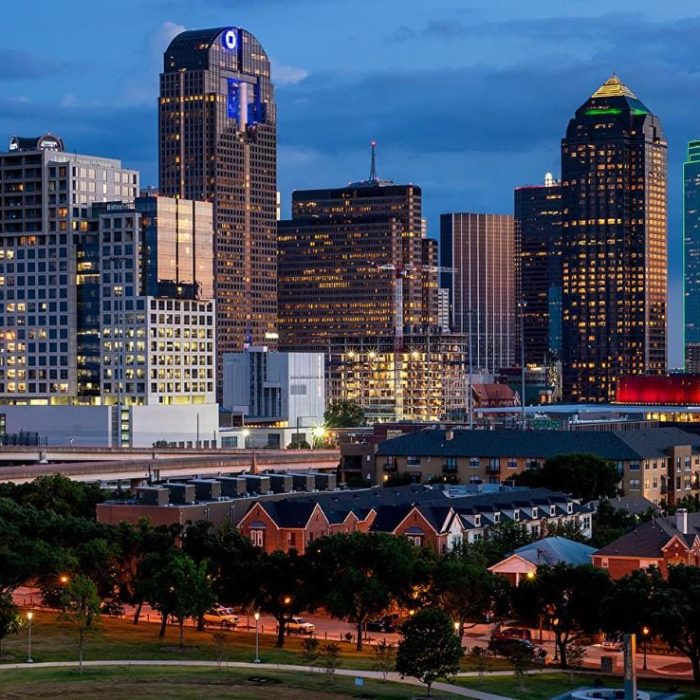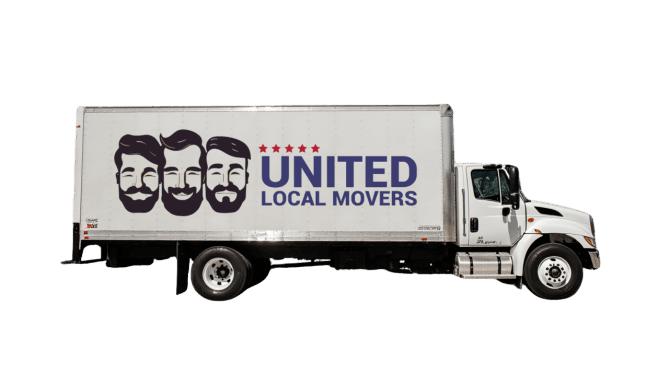Home > Interstate Moving > Moving to Texas > Moving to Dallas
Moving to Dallas
Dallas, Texas, is one of the fastest-growing metropolitan areas in the United States. With a population of 1.3 million in the city proper and over 7.7 million in the Dallas–Fort Worth metroplex, it is a hub of business, culture, and opportunity. Known for its iconic skyline, booming economy, and rich cultural diversity, Dallas blends Southern hospitality with big-city ambition.
Moving to Dallas means joining a city that offers something for everyone: world-class dining, thriving business districts, family-friendly suburbs, and a sports culture that borders on obsession. It’s also one of the most affordable large metros in the U.S., especially compared to coastal cities like New York or Los Angeles.
Of course, Dallas has its challenges — hot summers, heavy traffic, and urban sprawl can be difficult for newcomers. But for many, the combination of affordability, opportunity, and culture makes Dallas one of the most appealing relocation destinations in America.

Why More People Are Moving from Other States to Dallas
Dallas has become a magnet for people relocating from high-cost states like California, New York, and Illinois. The number one reason is affordability. Housing prices in Dallas are far lower than in coastal metros, making homeownership more attainable for families and young professionals.
Another major reason is job opportunities. The Dallas–Fort Worth metroplex is home to more than 20 Fortune 500 companies, including AT&T, American Airlines, ExxonMobil, and Southwest Airlines. Tech, finance, healthcare, and logistics are also booming industries in the area.
Texas’s tax advantages also play a role. With no state income tax, Dallas residents keep more of their earnings, which is especially appealing to professionals moving from states with high income taxes.
Lifestyle is another draw. Dallas offers a blend of urban sophistication and suburban comfort. From trendy neighborhoods like Uptown and Deep Ellum to family-oriented suburbs like Plano, Frisco, and McKinney, there’s something for every lifestyle.
Finally, Dallas’s central U.S. location makes it ideal for travel and business. Dallas/Fort Worth International Airport is one of the busiest in the world, connecting residents to destinations across the globe.
Pros of Living in Dallas
Affordability is the biggest advantage. While housing prices have risen in recent years, Dallas remains much more affordable than San Francisco, Los Angeles, or New York. Families can buy spacious homes in good neighborhoods at prices well below the national coastal averages.
The job market is another pro. Dallas’s economy is diverse and resilient. Even during national downturns, the city’s mix of industries — from energy and finance to healthcare and tech — provides stability.
Cultural diversity enriches life in Dallas. With significant Hispanic, African American, and Asian populations, the city is a melting pot reflected in its food, art, and festivals.
Education is another strength. Dallas is home to Southern Methodist University (SMU), the University of Texas at Dallas, and many strong public and private schools.
Finally, Dallas offers world-class amenities. The Arts District, one of the largest in the nation, is packed with museums, theaters, and performance spaces. Sports fans have endless options with the Cowboys, Mavericks, Stars, and Rangers just minutes away.

Ready to get moved? Get a FREE quote now
Book your move easily and stress-free!
Cons of Living in Dallas
The most obvious drawback is weather. Summers in Dallas are long, hot, and humid, with temperatures regularly topping 100°F. Winters are mild, but ice storms occasionally disrupt life.
Traffic is another issue. With a sprawling metro area and heavy reliance on cars, Dallas commutes can be frustrating. Highways like I-35 and I-635 are often congested, and public transit is limited compared to cities like Chicago or New York.
Urban sprawl is another con. Dallas is part of a metroplex that stretches for miles in every direction. While this means plenty of housing options, it also makes the city feel less centralized and harder to navigate.
Crime varies by neighborhood. While many areas are safe and family-friendly, some parts of Dallas have higher crime rates. Researching neighborhoods is important for newcomers.
Finally, while Dallas has plenty of culture, it may not match the entertainment density of cities like New York or Los Angeles. Residents often travel to Austin or Houston for certain types of nightlife or festivals.

What Life is Like in Dallas
Life in Dallas is dynamic, diverse, and opportunity-driven. The downtown area is a hub of business and entertainment, while neighborhoods like Uptown and Bishop Arts District provide trendy dining, shopping, and nightlife.
Suburban life is equally strong. Families flock to suburbs like Plano, Frisco, and Allen for top-rated schools, master-planned communities, and family-friendly amenities. These suburbs consistently rank among the best places to live in Texas.
Food culture is another highlight. Dallas is known for barbecue, Tex-Mex, and steakhouses, but its diversity means you’ll also find authentic Vietnamese, Ethiopian, and Indian cuisine. The city’s craft beer and food truck scenes are booming, adding to the variety.
Sports are central to Dallas life. The Cowboys dominate Sundays, but fans also support the Mavericks (NBA), Stars (NHL), Rangers (MLB), and FC Dallas (MLS). Sports culture is woven into the city’s identity.
Community events and festivals also thrive, from the State Fair of Texas to cultural celebrations like Cinco de Mayo and Diwali. Dallas blends big-city opportunities with small-town community pride.
Living Costs in Dallas
Dallas is more affordable than many large U.S. cities, though costs are rising. Housing remains the biggest advantage compared to national averages.
| Category | Dallas | National Average |
|---|---|---|
| Housing (Rent per Month) | $1,700 | $1,570 |
| Utilities | $180 | $180 |
| Groceries | $340 | $330 |
| Transportation | $160 | $140 |
| Healthcare | $430 | $440 |
Overall, Dallas allows families and professionals to enjoy a higher standard of living at a lower cost compared to many other major metros.

Ready to get moved? Get a FREE quote now
Ready to get moved? Get a FREE quote now
Schools and Education in Dallas
Dallas is served by Dallas Independent School District (DISD), one of the largest in Texas. The district offers magnet schools, charter schools, and bilingual programs. Schools like the School for the Talented and Gifted are nationally ranked.
Suburban school districts, including Plano ISD, Frisco ISD, and Allen ISD, are highly rated and attract families to those areas.
Higher education is another strength. Dallas is home to Southern Methodist University (SMU), a top-ranked private university, and the University of Texas at Dallas, known for its strong engineering and business programs.
Medical education is anchored by UT Southwestern Medical Center, one of the nation’s leading academic medical centers.
For families and students, Dallas offers a range of educational opportunities from K-12 through graduate school.
Transportation and Getting Around
Dallas is a sprawling metro area, and most residents rely on cars. Traffic congestion is common, particularly on I-35, I-635, and the Dallas North Tollway.
Public transportation is better than in some Texas cities but still limited. Dallas Area Rapid Transit (DART) operates buses and light rail, connecting downtown to suburbs like Plano and Richardson. However, coverage across the metroplex is uneven.
Cycling and walking are popular in certain neighborhoods like Uptown and Bishop Arts, but less practical in suburban areas.
For air travel, Dallas has two major airports: Dallas/Fort Worth International (DFW) and Dallas Love Field (DAL). This makes it one of the most connected metros in the U.S.

United Local Movers: Our Services
Relocating to Dallas requires expertise and reliability. United Local Movers specializes in stress-free relocations across Texas and beyond.
We provide professional packing, safe storage, and long-distance moving solutions. Whether you’re moving into a downtown high-rise, a suburban home in Plano, or a student apartment near SMU, our crews are trained to handle every detail.
With transparent pricing and tailored moving plans, United Local Movers ensures your relocation to Dallas is efficient and worry-free.
Average Cost to Move to Dallas
Moving costs vary depending on distance and services, but Dallas relocations are typically more affordable than coastal metros.
| Move Type | Estimated Cost |
|---|---|
| Local Move (1-2 Bedrooms) | $1,000–$2,200 |
| Cross-Country Move | $3,500–$6,700 |
| Full Packing Services | + $400–$900 |
| Storage Options | $130–$280 per month |
United Local Movers provides detailed, upfront estimates so clients know exactly what to expect.


How to Choose the Right Moving Company
When relocating to Dallas, choosing the right mover is key. Always verify licensing, insurance, and written estimates. Avoid movers who provide vague or unusually low quotes.
Customer reviews are a good guide for reliability and professionalism. Movers with local knowledge of Dallas neighborhoods and suburbs can save you time and stress.
United Local Movers combines professionalism, local expertise, and national service, making it a trusted choice for Dallas relocations.
Final Thoughts
Dallas is a city of opportunity, growth, and diversity. Its affordability, strong job market, and family-friendly communities make it one of the most appealing metros in the U.S. While traffic, sprawl, and hot summers present challenges, the benefits often outweigh the drawbacks.
For families, students, and professionals, Dallas provides a lifestyle that balances big-city energy with suburban comfort. And with United Local Movers, your move to Dallas can be smooth, efficient, and stress-free.





